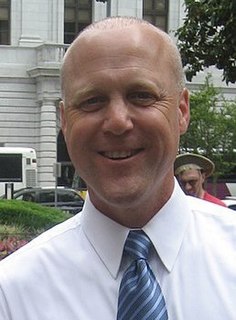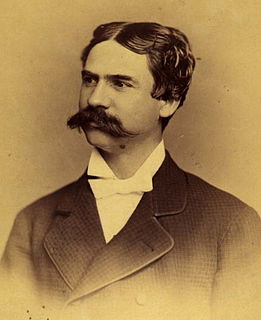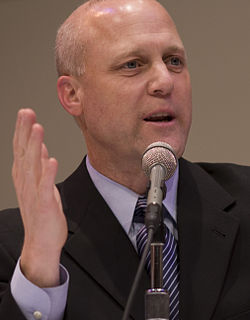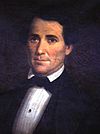
Mitchell Joseph Landrieu is an American politician and lawyer who was Mayor of New Orleans from 2010 to 2018. A Democrat, Landrieu served as Lieutenant Governor of Louisiana from 2004 to 2010 prior to becoming mayor.

The Louisiana gubernatorial election of 1963–64 was held in three rounds. The two Democratic Party primaries were held on December 7, 1963 and January 11, 1964. The general election was held on March 3, 1964. The 1964 election saw the election of John McKeithen as governor.

The Louisiana gubernatorial election of 1959–60 was held in two rounds on December 5, 1959, and January 9, 1960. After an election which featured some of the most racially charged campaign rhetoric in Louisiana political history, Jimmie Davis was elected to his second nonconsecutive term as governor after defeating the Republican candidate, Francis Grevemberg, in the general election.

The Louisiana gubernatorial election of 1936 was held on January 21, 1936. Like most Southern states between the Reconstruction Era and the Civil Rights Movement, Louisiana's Republican Party was virtually nonexistent in terms of electoral support. This meant that the Democratic Party primary held on this date was the real contest over who would be governor. The election resulted in the victory of Richard W. Leche of New Orleans as governor. Leche was supported by the Longite faction of the party and Cleveland Dear of Alexandria by the anti-Longs' "Home Rule" ticket. State Representative Mason Spencer of Tallulah dropped out of the race and endorsed Dear, but the ballots had already been printed, and he received nearly two thousand votes.

The Louisiana gubernatorial election of 1932 was held on January 19, 1932. Like most Southern states between the Reconstruction Era and the Civil Rights Movement, Louisiana's Republican Party had virtually no electoral support. This meant that the Democratic Party primary held on this date was the real contest over who would be governor. The election resulted in the election of Oscar K. Allen as governor of Louisiana. Louisiana was one of only two states that held the election on a date other than the first Tuesday following the first Monday of November.

The Louisiana gubernatorial election of 1920 was held on April 20, 1920. Like most Southern states between the Reconstruction Era and the Civil Rights Movement, Louisiana's Republican Party had virtually no electoral support. This meant that the Democratic Party primary held on January 20 was the real contest over who would be governor. The election resulted in the election of John M. Parker as governor of Louisiana.

Henry Clay Warmoth was an American attorney, Civil War officer in the Union Army, who was elected governor and state representative of Louisiana. A Republican, he was 26 years old when elected as 23rd Governor of Louisiana, one of the youngest governors elected in United States history. He served during the early Reconstruction Era, from 1868 to 1872.
The Louisiana Democratic Party is the affiliate of the national Democratic Party of the United States in the state of Louisiana.

The Republican Party of Louisiana is the U.S. state of Louisiana's organization of the national Republican Party. The state chairman is Louis Gurvich, a businessman from New Orleans, who was elected on February 24, 2018. Since the late 20th century, white conservatives in the states have mostly shifted to the Republican Party from the Democratic Party. As of 2016, every statewide elected official in Louisiana, with the exception of the governor, is a Republican.

The 2010 New Orleans mayoral election was held on February 6, 2010 to elect the Mayor of New Orleans, Louisiana. Incumbent Democratic Mayor Ray Nagin was term-limited and ineligible to run for re-election to a third term.

Louisiana's 2011 state elections were held on October 22, 2011, with runoff elections held on November 19. All statewide elected offices were up, as well as all seats in the Louisiana State Legislature.

The Louisiana gubernatorial election of 1912 was held on April 16, 1912. Like most Southern states between Reconstruction and the civil rights era, Louisiana's Republican Party was virtually nonexistent in terms of electoral support. This meant that the Democratic Party primary held on January 23 was the real contest over who would be governor. The election resulted in the election of Democrat Luther E. Hall as governor of Louisiana.

The Louisiana gubernatorial election of 1908 was held on April 21, 1908. Like most Southern states between Reconstruction and the civil rights era, Louisiana's Republican Party had virtually no electoral support. This meant that the Democratic Party primary held on January 28 was the real contest over who would be governor. This election marked the first time Louisiana used primaries to nominate party nominees. The election resulted in the election of Democrat Jared Y. Sanders, Sr. as governor of Louisiana.

The Louisiana gubernatorial election of 1904 was held on April 19, 1904. Like most Southern states between Reconstruction and the civil rights era, Louisiana's Republican Party had virtually no electoral support. As Louisiana had not yet adopted party primaries, this meant that the Democratic Party convention nomination vote was the real contest over who would be governor. The election resulted in the election of Democrat Newton C. Blanchard as governor of Louisiana.

The Louisiana gubernatorial election of 1900 was held on April 17, 1900. Like most Southern states between Reconstruction and the civil rights era, Louisiana's Republican Party had virtually no electoral support. As Louisiana had not yet adopted party primaries, this meant that the Democratic Party convention nomination vote was the real contest over who would be governor. However, Donelson Caffery, Jr. ran a strong third party campaign. The election resulted in the election of Democrat William Wright Heard as governor of Louisiana.

The Louisiana gubernatorial election of 1892 was held on April 19, 1892. Like most Southern states between Reconstruction and the civil rights era, Louisiana's Republican Party was virtually nonexistent in terms of electoral support. In addition, the Republican Party had split into two factions, each supporting a different candidate. As Louisiana had not yet adopted party primaries, this meant that the Democratic Party convention nomination vote was supposed to be the real contest over who would be governor. At the convention, pro-lottery former Governor Samuel D. McEnery was nominated. As a result of the nomination of a pro-lottery candidate, a group of anti-lottery Democrats nominated their own candidate, State Senator Murphy J. Foster. In addition to the four candidates already mentioned, the increasingly popular Populists nominated R. H. Tannehill and their candidate. Despite all of this, Senator Foster was elected with 45% of the vote with a comfortable 19% margin between him and McEnery, who placed second. This election marked the last time until 1979 that the official Democratic Party nominee was defeated.

The Louisiana gubernatorial election, 1855, was the second election to take place under the Louisiana Constitution of 1852. As a result of this election Robert C. Wickliffe became Governor of Louisiana.

The Louisiana gubernatorial election, 1868, was the first election to take place under the Louisiana Constitution of 1868. As a result of this election Henry C. Warmoth was elected Governor of Louisiana. At age 26 he was the youngest governor in the state's history. The result was a lop-sided result for Warmoth because of the Republican Party's overwhelming support amongst the freedmen who were the voting majority in the state at the time.

The Louisiana gubernatorial election, 1872, was the second election to take place under the Louisiana Constitution of 1868. As a result of this election William Pitt Kellogg was elected Governor of Louisiana, but not before federal troops stepped in to enforce his election. The results of this election were highly contentious and resulted in racial violence across the state. U. S. President Ulysses S. Grant had to step in and formally recognize Kellogg as Governor to resolve the violence. Kellogg's Democratic opponent John McEnery finally conceded the election in September 1874 after briefly overthrowing Kellogg's government.

The Louisiana gubernatorial election, 1876, was the third and final election to take place under the Louisiana Constitution of 1868. As a result of this election Francis T. Nicholls became Governor of Louisiana, but not before the election was contested by his opponent. The results of this election, like those of 1872 were disputed. The dispute was resolved by the Compromise of 1877 which gave the Governor's Mansion to Democrat Francis T. Nicholls. The Compromise also gave Republican presidential candidate Rutherford B. Hayes the electoral votes of several disputed states, including Louisiana, which resulted in his election to the White House. The election of Nicholls marked the end of Reconstruction in Louisiana and the decline of the Republican Party of Louisiana.











